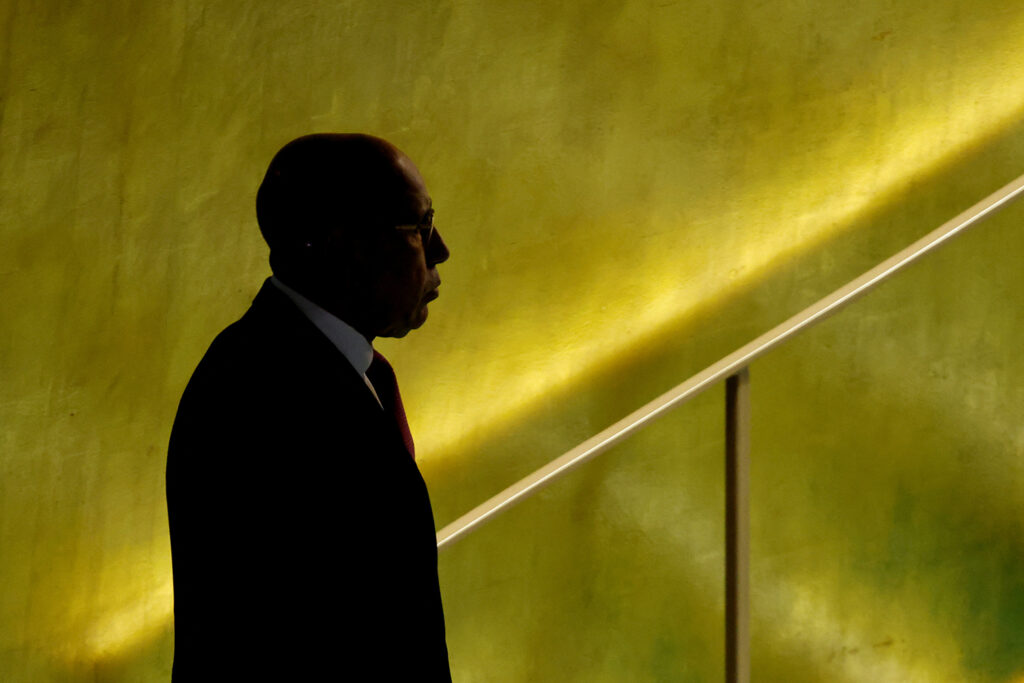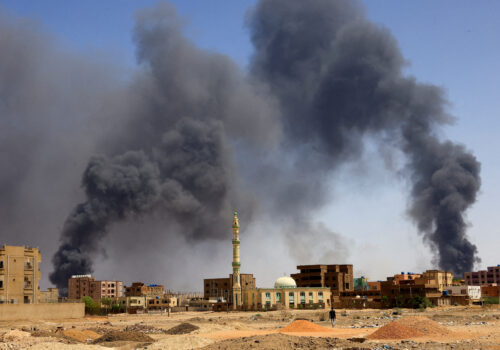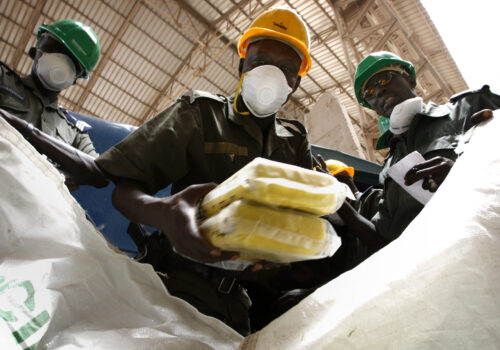In Mali, government-aligned forces are fighting terrorist and nonterrorist armed groups in a manner reminiscent of the country’s 2012 Tuareg Rebellion. This time, however, the international community hardly seems to have noticed. This is cause for concern.
No Western partner is swooping in to assist Mali’s overburdened military, as France once did. Mali’s current approach, reliant on show-of-force air strikes and support from the Russian Wagner mercenary group, has failed to deliver a decisive victory. In late July, armed groups killed as many as forty-seven Malian soldiers and eighty-four Wagner mercenaries near the Algerian border, sparking a new round of fighting.
There is only one way to avert further loss of life and territorial contestation: mediation. Algiers, which has brokered multiple hostage releases and peace deals in northern Mali—including the 2015 Algiers Accord—is no longer a welcome interlocutor. Bamako has accused Algiers of meddling in its affairs by meeting rebel leaders. Mali’s neighbors to the east, Burkina Faso and Niger, are too consumed with their own domestic security challenges to play a meaningful role. But Mauritania, Mali’s neighbor to the west, is in a unique position to foster peace.
The case for Mauritania
Mauritania is a relatively stable country, whose historic neutrality in regional disputes has earned it generally positive foreign relationships. Previous attempts at mediation have failed to install an enduring peace in northern Mali, largely because they were not inclusive. But with its neutrality, Mauritania has the ability to talk to all conflict parties in northern Mali—nonterrorist armed groups, terrorists, and government-aligned forces. This offers distinct advantages.
Mauritania’s president, Mohamed Ould El Ghazouani, was recently inaugurated for a second and final term, which he is serving concurrently with the African Union (AU) chairmanship. The AU has substantial convening power, and Ghazouani is an ideal mediator because of Mauritania’s neutrality, making the timing optimal for a push for regional peace.
Peace would advance Mauritania’s interests, too. Mali’s widening conflict has destabilized its eastern border. More than 55,000 Malians fled to Mauritania last year, flooding refugee camps. Mauritania accused the Malian Armed Forces (FAMa) and Wagner of crossing the eastern border and killing Mauritanians. Mediation offers Ghazouani an opportunity to stem the refugee flow and permanently end the violent cross-border incursions that have killed his constituents.
It won’t be easy
The two primary parties in the conflict, Jama’at Nusrat al-Islam wal-Muslimin (JNIM) and the Malian transition government, have opposing goals. JNIM is an al-Qaeda affiliate and aims to displace the government, whereas Bamako aims to eradicate terrorism and assert control over its territory. At the same time, an anti-government, nonterrorist armed group coalition—the Permanent Strategic Framework for the Defense of the People of Azawad (CSP-DPA)—is fighting for greater regional autonomy and economic opportunity. The CSP-DPA’s relationship with JNIM is unclear.
Regardless, none of the parties have given Mauritania consent to mediate, so Nouakchott will need to operate outside of a formal peace process, at least at the outset. This is risky but necessary. Bamako has gradually driven away French, European Union, and United Nations (UN) troops over the past few years, demonstrating its hostility to international stabilization efforts. The Malian transition government would probably reject a request to engage terrorist or nonterrorist armed group leaders.
The conflict still merits mediation. After months of fighting, no actor has achieved sustained momentum on the battlefield. There are clashes, of course, but the conflict is nowhere near over. The FAMa and Wagner have expended large amounts of munitions during offensive operations. These operations have displaced and killed northern civilians while failing to meaningfully degrade the capabilities of armed groups. Armed groups have withdrawn to more remote areas of the Sahara Desert, where they are expending scarce resources to survive. This cannot go on forever.
Ending the war
Here’s how Mauritania can bring all the parties to the negotiating table:
1. Open a direct line of communication with northern leaders
Mauritania is well-positioned to initiate contact with the leaders of terrorist and nonterrorist armed groups, given the historic relationship that its Beidane (White Moor) population has with Mali’s Tuareg population. The two ethnic groups have historically adopted similar migration patterns, and their personal, religious, and business connections persist to this day. Mauritanian citizens have maintained ties with populations in northern Mali by traversing age-old transhumance routes.
Mauritania should leverage these relationships and routes to initiate contact with leaders of terrorist and nonterrorist armed groups, many of whom are Malian Tuareg, without arousing suspicion. Once contact is made, Mauritania should arrange low-profile in-person meetings with select leaders of these armed groups to determine whether they are amenable to further engagement.
2. Persuade JNIM leaders to defect from al-Qaeda
Mauritania must clearly articulate the value of further engagement to leaders of terrorist and nonterrorist armed groups. JNIM is particularly important, as its members never reconciled with Bamako or laid down their arms. Their operations, as well as their continued recruitment of northern populations, made true peace impossible. JNIM’s leaders are thus critical to the installation of an enduring peace in northern Mali.
Mauritania can offer incentives for armed group leaders to engage in mediation. For example, it can offer to intercede with the Malian transition government on their behalf, push for pauses in military operations, and legitimize their bid for northern leadership.
JNIM’s Tuareg leaders may be receptive to the argument that, without this support, it will be impossible for them to evade persecution and exert true leadership over northern Mali, their homeland. Their ambition to secure leadership in their homeland predates JNIM’s establishment, after all. Ultimately, however, only engagement can reveal whether they are open to mediation.
Mauritania’s offer to mediate must come with conditions: JNIM’s Tuareg leaders must commit to disaffiliation with both al-Qaeda and JNIM. They must permanently cease all terrorist activity, and they must stop attacking civilians or permitting youth to serve as fighters. The leaders may choose not to accept these conditions; if that is the case, they must not be included in talks.
This step assumes that mass Tuareg defection from JNIM will not prompt conflict with one of its major factions, the Fulani-dominated Macina Liberation Front (MLF). Evidence suggests that the MLF will not instigate a violent conflict, as this would ultimately drain their resources. There is a strong incentive for the MLF to accept mass defection, and the risk of fratricidal conflict is thus low. It is far more likely that severing JNIM improves Mali’s long-term stability.
3. Solicit formal consent to mediate the conflict in northern Mali
Mauritania should make a formal bid to mediate this conflict. Ghazouani can arrange meetings with each conflict party and seek their consent to initiate multiparty talks. If the previous steps succeeded, leaders of terrorist and nonterrorist armed groups may have already agreed to talks. Ghazouani can thus “deliver” JNIM and the CSP-DPA to Malian officials.
The Malian transition government will be difficult to persuade to enter multiparty talks. This year, the FAMa deployed and held territory in northern Mali. The recapture of Kidal in November 2023 was a major symbolic victory. Bamako may wish to continue fighting. If this is the case, the best strategy for engaging government officials would be to praise Mali’s strength.
Ghazouani should personally travel to Bamako to meet the interim president, Colonel Assimi Goïta. Ghazouani and Goïta are both military commanders who participated in coups d’état in their respective countries. Ghazouani is the elder of the two, and he has successfully navigated the transition from military to civilian leader. He can advise Goïta.
Ghazouani can praise Goïta’s leadership and make the argument that the Malian leader played a decisive role in bringing CSP-DPA and JNIM leaders to the table. He should also highlight the benefits of participating in multiparty talks. Settling the conflict in the north would allow the FAMa and Wagner to shift focus and dedicate more troops to the faltering counterterrorism campaign against the MLF in central Mali. The MLF recently launched a deadly attack against military facilities in Bamako. In light of this, Goïta may be receptive to this argument.
4. Seek international support for the peace process
After acquiring Goïta’s consent, Mauritania should seek backing from the international community and begin planning the first round of talks in Nouakchott. Ghazouani can capitalize on his position as AU chairman to form a Northern Mali Contact Group. The contact group would help coordinate, fund, and execute programming in support of negotiated outcomes of the multiparty talks.
It is very important that the group balance different perspectives and international alliances. Mali’s military junta swapped the country’s Western security partners for Wagner, and Bamako would object if the group contains a disproportionate number of Western states. Ghazouani’s initial efforts should focus on the five permanent members of the UN Security Council (UNSC). Two are not part of the West, and all are involved in regional initiatives.
Mauritania’s neutrality affords it positive relations with all the UNSC permanent members. Accordingly, it is well-equipped to navigate any tensions among them. It must emphasize that the permanent members have a common interest: improving stability. This is only achievable if they collaborate.
Within North and West Africa, Ghazouani should focus initial efforts on recruiting former members of the Algiers Accord Monitoring Committee: Algeria, Burkina Faso, Chad, Niger, and Mauritania. Morocco should be included as well, to avoid upsetting the regional balance of power. These six states all stand to benefit from a peaceful and secure northern Mali.
Once the Northern Mali Contact Group is established, Ghazouani and the AU should focus on coordinating, funding, and executing programs in parallel to the multiparty talks. The parties to the conflict are extremely sensitive to external meddling. The Northern Mali Contact Group must keep the parties’ goals at the center of this deliberative process.
Parting shots
This is an ambitious concept, but it seizes upon the many advantages afforded by Mauritania’s current position. It generates momentum for multiparty talks by engaging terrorist and nonterrorist armed group leaders. It then uses their willingness to negotiate as a bargaining chip with which to compel the government to permit multiparty talks. It concludes by seeking external backing.
Considering and including representatives from all conflict parties in northern Mali is the pathway to a more durable, inclusive political settlement that brings peace to a region historically beset by violent conflict.
Jordanna Yochai is a defense analyst, whose portfolio includes the West African Sahel. She is currently on leave from the Department of Defense, pursuing a master’s degree at Columbia University’s School of International and Public Affairs (SIPA).
The positions expressed in this article do not reflect the official position of the US Department of Defense. The US Department of Defense does not endorse the views expressed in hyperlinked articles or websites, including any information, products, or services contained therein.

The Africa Center works to promote dynamic geopolitical partnerships with African states and to redirect US and European policy priorities toward strengthening security and bolstering economic growth and prosperity on the continent.
Further reading
Thu, Sep 19, 2024
The Sudan crisis has become a magnet for foreign malign influence and strategic corruption
New Atlanticist By
To help bring about an end to the war in Sudan, the United States should stem the illicit activities of foreign actors fueling the conflict.
Wed, Sep 18, 2024
The Sahel is now an epicenter of drug smuggling. That is terrible news for everyone.
AfricaSource By Alexander Tripp
The international community may be overlooking an emerging threat in the Sahel—one that will have colossal impacts for geopolitics in the region and beyond.
Mon, Sep 30, 2024
Could the United States’ future liftoffs take place in Africa?
AfricaSource By
By working together on expanding the roster of rocket launch sites available to the United States, Washington and its African partners can set a global standard for responsible space exploration.
Image: Mauritania's president, Mohamed Ould Cheikh El Ghazouani, arrives to address the 79th United Nations General Assembly at UN headquarters in New York on September 24, 2024. Photo via REUTERS/Eduardo Munoz



